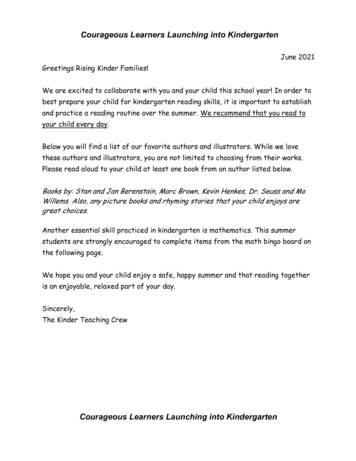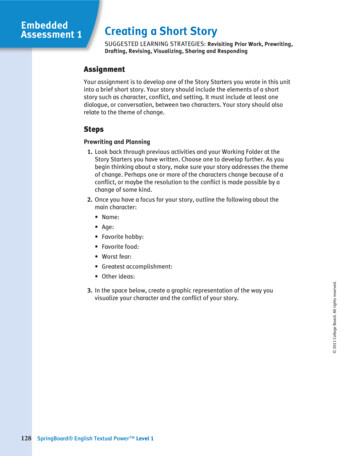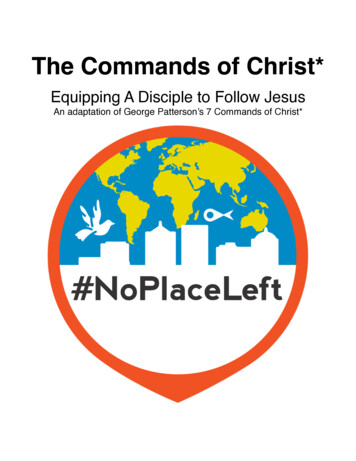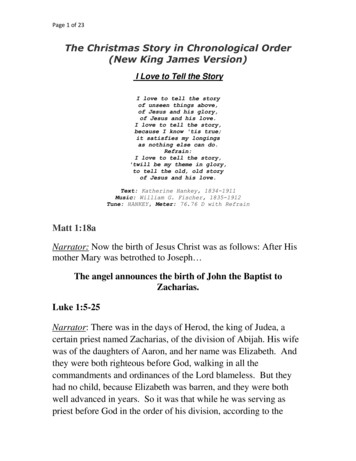
Transcription
Kenneth Blanchard & Spenser Johnson – THE ONE MINUTE MANAGERRead a StoryThat WillChange Your Life!The One Minute Manager is an easily read story which quickly shows you threevery practical management techniques. As the story unfolds, you will discover severalstudies in medicine and the behavioral sciences which help you to understand why theseapparently simple methods work so well with so many people. By the book’s end youwill also know how to apply them to your own situation.The book is brief, the language is simple, and best of all . it works!That’s why The One Minute Manager has become America’s national sensation,featured in People magazine, and on The Today Show, The Merv Griffin Show, andother network television programs.1
Kenneth Blanchard & Spenser Johnson – THE ONE MINUTE MANAGERBooks by Kenneth H. Blanchard, Ph.D.MANAGEMENT OF(with Paul Hersey).ORGANIZATIONALBEHAVIOR:UTILIZINGHUMAN RESOURCESORGANIZATIONAL CHANGE THROUGH EFFECTIVE LEADERSHIP (with Robert H. Guest andPaul Hersey).THE FAMILY GAME: A SITUATIONAL APPROACH TO EFFECTIVE PARENTING (with PaulHersey).PUTTING THE ONE MINUTE MANAGER TO WORK (with Robert Lorber, Ph.D.).Books by Spencer Johnson, M.D.THE ONE MINUTE FATHERTHE ONE MINUTE MOTHERTHE PRECIOUS PRESENT: THE GIFT THAT MAKES A PERSON HAPPY FOREVERTHE VALUETALE SERIES:THE VALUE OF BELIEVING IN YOURSELF, The Story of Louts PasteurTHE VALUE OF PATIENCE, The Story of the Wright BrothersTHE VALUE OF KINDNESS, The Story of Elizabeth FryTHE VALUE OF HUMOR, The Story of Will RogersTHE VALUE OF COURAGE, The Story of Jackie RobinsonTHE VALUE OF CURIOSITY, The Story of Christopher ColumbusTHE VALUE OF IMAGINATION, The Story of Charles DickensTHE VALUE OF SAVING, The Story of Benjamin FranklinTHE VALUE OF SHARING, The Story of the Mayo BrothersTHE VALUE OF HONESTY, The Story of ConfuciusTHE VALUE OF UNDERSTANDING, The Story of Margaret MeadTHE VALUE OF FANTASY, The Story of Hans Christian AndersonMost Berkley books are available at special quantity discounts for bulk purchases or sales promotions,premiums, fund raising, or educational use. Special books or book excerpts can also be created to fitspecific needs.For details, write or telephone Special Markets, The Berkley Publishing Group, 200 Madison Avenue, NewYork, New York 10016; (212) 951-8800.2
Kenneth Blanchard & Spenser Johnson – THE ONE MINUTE MANAGER“All managers and executives can easily use The One Minute Manager to build a moreefficient organization. Those who have tried it, like it.”—ROY ANDERSON, Chairman of theBoard & Chief Executive Officer,Lockheed Corp.“Not since Up the Organization have I read such a straightforward, innovative book asThe One Minute Manager. Should be command reading for every restauranteur andhotelier in the country.”—DONALD I. SMITH, Director,School of Hotel, Restaurant andInstitutional Management,College of Business,Michigan State University“Quite simply, The One Minute Manager can help any manager to assist his people tobecome peak performers. I include it in all my work with American corporations seekingto improve productivity, profitability and performance.”—CHARLES A. GARFIELD, Ph.D.,President, PEAK Performance Center;Clinical Professor,University of California, Berkeley“In government, criticizing performance has become the dominant managementtechnique. The One Minute Manager’s approach of catching someone doing somethingright would be far more effective.”—DAVID C. JONES, General,U.S.A.E, Retired,Former Chairman,The Joint Chiefs of Staff“The best management book I’ve read. I couldn’t put it down. I’ve bought copies for allmy key managers, and now they are doing the same for their people.”—JERE W. THOMPSON, PresidentThe Southland Corporation7-Eleven Convenience Stores“Finally there is a short, readable, practical guide to effective management! We havemore than a thousand copies of The One Minute Manager available to our managers.”—ERNEST E. RENAUD, President& Chief Executive Officer,Jerrico, Inc.“I believe The One Minute Manager should be made ‘standard issue’ at all managementdevelopment training programs from new managers’ school to advanced management3
Kenneth Blanchard & Spenser Johnson – THE ONE MINUTE MANAGERtraining. It embodies (in an easy-to-read form) the fundamental principles of peoplemanagement we are trying to instill in our management team. I have made it requiredreading for all our managers.”—DAVID HANNA, PresidentGRiD Systems Corporation“Buying copies of The One Minute Manager is one of the best investments I’ve made inmyself and in our managers.”—LOUIS P. NEEB, PresidentFast Food Division, W. R. Grace & Co.(formerly Chairman of the Board,Burger King Corp.)“Should you apply one-minute management? Yes!”—WORKING WOMAN“The One Minute Manager . don’t miss it!”—MERV GRIFFIN“Our managers are using The One Minute Manager’s practical method in our ‘YellowPages’ operation all over the world. There is no doubt about it—it works!”—R. W. BUTLER, President,GTE Directories Corporation“Our whole management has profited from reading The One Minute Manager.”—MICHAEL D. ROSE, President& Chief Executive Officer,Holiday Inn, Inc.“I gave copies to my boss, my subordinates, other refinery managers, and even to mywife, our close friends and our clergy. It has that kind of broad appeal and it’s that good!”—ROBERT W. DAVIS, PresidentChevron Chemical Company“This book shows us how to manage our encounters with people in such a way thateveryone benefits! Very enlightening!”—EARL NIGHTINGALERadio commentator,OUR CHANGING WORLD4
Kenneth Blanchard & Spenser Johnson – THE ONE MINUTE MANAGERThis Berkley book contains the completetext of the original hardcover edition.THE ONE MINUTE MANAGERA Berkley Book / published by arrangement withWilliam Morrow and Company, Inc.PRINTING HISTORYWilliam Morrow and Company edition published 1982Berkley trade paperback edition / October 1983All rights reserved.Copyright 1981, 1982 by Blanchard Family Partnershipand Candle Communications Corporation.This book may not be reproduced in whole or in part,by mimeograph or any other means, without permission.For information address: William Morrow and Company, Inc.105 Madison Avenue, New York, New York 10016.ISBN: 0-425-09847-8A BERKLEY BOOK TM 757,375Berkley Books are published by The Berkley Publishing Group,200 Madison Avenue, New York, New York 10016.The name “BERKLEY” and the “B” logoare trademarks belonging to Berkley Publishing Corporation.PRINTED IN THE UNITED STATES OF AMERICA5049485
Kenneth Blanchard & Spenser Johnson – THE ONE MINUTE MANAGERTheOneMinuteManagerKenneth Blanchard, Ph.D.Spencer Johnson, M.D.BERKLEY BOOKS, NEW YORK6
Kenneth Blanchard & Spenser Johnson – THE ONE MINUTE MANAGERContentsThe SearchThe One Minute ManagerThe First Secret: One Minute GoalsOne Minute Goals: SummaryThe Second Secret: One Minute PraisingsOne Minute Praisings: SummaryThe AppraisalThe Third Secret: One Minute ReprimandsOne Minute Reprimands: SummaryThe One Minute Manager ExplainsWhy One Minute Goals WorkWhy One Minute Praisings WorkWhy One Minute Reprimands WorkThe New One Minute ManagerA Gift to YourselfA Gift to OthersAcknowledgmentsAbout the Authors7
Kenneth Blanchard & Spenser Johnson – THE ONE MINUTE MANAGERThe SymbolThe One Minute Manager’s symbol—a one minute readoutfrom the face of a modern digital watch—is intended toremind each of us to take a minute out of our day to lookinto the faces of the people we manage. And to realize thatthey are our most important resources.8
Kenneth Blanchard & Spenser Johnson – THE ONE MINUTE MANAGERIntroductionIn this brief story, we present you with a great deal of what we have learned from ourstudies in medicine and in the behavioral sciences about how people work best with otherpeople.By “best,” we mean how people produce valuable results, and feel good aboutthemselves, the organization and the other people with whom they work.This allegory, The One Minute Manager, is a simple compilation of what many wisepeople have taught us and what we have learned ourselves. We recognize the importanceof these sources of wisdom. We also realize that the people who work with you as theirmanager will look to you as one of their sources of wisdom.We trust, therefore, that you will take the practical knowledge you gain from this bookand use it in your daily management. For as the ancient sage, Confucius, advises each ofus: “The essence of knowledge is, having it, to use it.”We hope you enjoy using what you learn from The One Minute Manager and that, as aresult, you and the people you work with will enjoy healthier, happier and moreproductive lives.Kenneth Blanchard, Ph.D.Spencer Johnson, M.D.9
Kenneth Blanchard & Spenser Johnson – THE ONE MINUTE MANAGERThe SearchONCE there was a bright young man who was looking for an effective manager.He wanted to work for one. He wanted to become one.His search had taken him over many years to the far corners of the world.He had been in small towns and in the capitals of powerful nations.He had spoken with many managers: with government administrators and militaryofficers, construction superintendents and corporate executives, university presidents andshop foremen, utility supervisors and foundation directors, with the managers of shopsand stores, of restaurants, banks and hotels, with men and women—young and old.He had gone into every kind of office, large and small, luxurious and sparse, withwindows and without.He was beginning to see the full spectrum of how people manage people.But he wasn’t always pleased with what he saw.He had seen many “tough” managers whose organizations seemed to win while theirpeople lost.Some of their superiors thought they were good managers.Many of their subordinates thought otherwise.As the man sat in each of these “tough people’s” offices, he asked, “What kind of amanager would you say you are?”Their answers varied only slightly.“I’m an autocratic manager—I keep on top of the situation,” he was told. “A bottomline manager.” “Hard-nosed.” “Realistic.” “Profit-minded.”He heard the pride in their voices and their interest in results.The man also met many “nice” managers whose people seemed to win while theirorganizations lost.Some of the people who reported to them thought they were good managers.Those to whom they reported had their doubts.As the man sat and listened to these “nice” people answer the same question, he heard,“I’m a democratic manager.” “Participative.” “Supportive.” “Considerate.”“Humanistic.”He heard the pride in their voices and their interest in people.But he was disturbed.It was as though most managers in the world were primarily interested either in resultsor in people.The managers who were interested in results often seemed to be labeled “autocratic,”while the managers interested in people were often labeled “democratic.”The young man thought each of these managers—the “tough” autocrat and the “nice”democrat—were only partially effective. “It’s like being half a manager,” he thought.He returned home tired and discouraged.He might have given up his search long ago, but he had one great advantage. He knewexactly what he was looking for.“Effective managers,” he thought, “manage themselves and the people they work withso that both the organization and the people profit from their presence.”10
Kenneth Blanchard & Spenser Johnson – THE ONE MINUTE MANAGERThe young man had looked everywhere for an effective manager but had found only afew. The few he did find would not share their secrets with him. He began to think maybehe would never find out what really made an effective manager tick.Then he began hearing marvelous stories about a special manager who lived,ironically, in a nearby town. He heard that people liked to work for this man and that theyproduced great results together. The young man wondered if the stories were really trueand, if so, whether this manager would be willing to share his secrets with him.Curious, he telephoned the special manager’s secretary for an appointment. Thesecretary put him through immediately.The young man asked this special manager when he could see him. He heard, “Anytime this week is fine, except Wednesday morning. You pick the time.”The young man quietly chuckled because this supposedly marvelous manager soundedlike a “kook” to him. What kind of manager had that kind of time available? But theyoung man was fascinated. He went to see him.11
Kenneth Blanchard & Spenser Johnson – THE ONE MINUTE MANAGERThe One Minute ManagerWHEN the young man arrived at the manager’s office, he found him standing andlooking out of the window. When the young man coughed, the manager turned andsmiled. He invited the young man to sit down and asked, “What can I do for you?”The young man said, “I’d like to ask you some questions about how you managepeople.”The manager willingly said, “Fire away.”“Well, to begin with, do you hold regularly scheduled meetings with yoursubordinates?”“Yes, I do—once a week on Wednesdays from 9:00 to 11:00. That’s why I couldn’tsee you then,” responded the manager.“What do you do at those meetings?” probed the young man.“I listen while my people review and analyze what they accomplished last week, theproblems they had, and what still needs to be accomplished. Then we develop plans andstrategies for the next week.”“Are the decisions made at those meetings binding on both you and your people?”questioned the young man.“Of course they are,” insisted the manager. “What would be the point of having themeeting if they weren’t?”“Then you are a participative manager, aren’t you?” asked the young man.“On the contrary,” insisted the manager, “I don’t believe in participating in any of mypeople’s decision-making.”“Then what is the purpose of your meetings?”“I already told you that,” he said. “Please, young man, do not ask me to repeat myself.It is a waste of my time and yours.“We’re here to get results,” the manager continued. “The purpose of this organizationis efficiency. By being organized we are a great deal more productive.”“Oh, so you’re aware of the need for productivity. Then you’re more results-orientedthan people-oriented,” the young man suggested.“No!” the manager resounded, startling his visitor. “I hear that all too often.” He got tohis feet and began to walk about. “How on earth can I get results if it’s not throughpeople? I care about people and results. They go hand in hand.“Here, young man, look at this.” The manager handed his visitor a plaque. “I keep iton my desk to remind me of a practical truth.”12
Kenneth Blanchard & Spenser Johnson – THE ONE MINUTE MANAGERêPeople Who FeelGood AboutThemselvesProduceGood Resultsê13
Kenneth Blanchard & Spenser Johnson – THE ONE MINUTE MANAGERAs the young man looked at the plaque, the manager said, “Think about yourself.When do you work best? Is it when you feel good about yourself? Or when you don’t?”The young man nodded as he began to see the obvious. “I get more done when I’mfeeling good about myself,” he responded.“Of course you do,” the manager agreed. “And so does everyone else.”The young man raised his index finger with new-found insight. “So,” he said, “helpingpeople to feel good about themselves is a key to getting more done.”“Yes,” the manager agreed. “However, remember productivity is more than just thequantity of work done. It is also the quality.” He walked over to the window and said,“Come over here, young man.”He pointed to the traffic below and asked, “Do you see how many foreign cars thereare on the road?”The young man looked out at the real world, and said, “I see more of them every day.And I guess that’s because they’re more economical and they last longer.”The manager nodded reluctantly and said “Exactly. So why do you think people arebuying foreign cars? Because American manufacturers did not make enough cars? Or,”the manager said without interrupting, “because they did not make the quality car theAmerican public really wanted?“Now that I think of it,” the young man answered, “it’s a question of quality andquantity.”“Of course,” the manager added. “Quality is simply giving people the product orservice they really want and need.”The older man stood at the window lost in his thoughts. He could remember, not solong ago, when his country provided the technology that helped to rebuild Europe andAsia. It still amazed him that America had fallen so far behind in productivity.The young man broke the manager’s concentration. “I’m reminded of an ad I saw ontelevision,” the visitor volunteered. “It showed the name of the foreign car, and over itcame the words If you’re going to take out a long-term car loan, don’t buy a short-termcar.”The manager turned and said quietly, “I’m afraid that’s a rather good summary. Andthat’s the whole point. Productivity is both quantity and quality.”The manager and his visitor began to walk back towards the couch. “And frankly, thebest way to achieve both of these results is through people.”The young man’s interest increased. As he sat down, he asked, “Well, you’ve alreadysaid that you’re not a participative manager. Just how would you describe yourself?”“That’s easy,” he responded without hesitation. “I’m a One Minute Manager.”The young man’s face showed surprise. He’d never heard of a One Minute Manager.“You’re a what?”The manager laughed and said, “I’m a One Minute Manager. I call myself thatbecause it takes very little time for me to get very big results from people.”Although the young man had spoken with many managers, he had never heard onetalk like this. It was hard to believe. A One Minute Manager—someone who gets goodresults without taking much time.Seeing the doubt on his face the manager said, “You don’t believe me, do you? Youdon’t believe that I’m a One Minute Manager.”“I must admit it’s hard for me even to imagine,” the young man responded.14
Kenneth Blanchard & Spenser Johnson – THE ONE MINUTE MANAGERThe manager laughed and said, “Listen, you’d better talk to my people if you reallywant to know what kind of manager I am.”The manager leaned over and spoke into the office intercom. His secretary, Ms.Metcalfe, came in moments later and handed the young man a sheet of paper.“Those are the names, positions and phone numbers of the six people who report tome,” the One Minute Manager explained.“Which ones should I talk to?” the young man asked.“That’s your decision,” the manager responded. “Pick any name. Talk to any one ofthem or all of them.”“Well, I mean who should I start with?”“I already told you, I don’t make decisions for other people,” the manager said firmly.“Make that decision yourself.” He stood up and walked his visitor towards the door.“You have asked me, not once, but twice, to make a simple decision for you. Frankly,young man, I find that annoying. Do not ask me to repeat myself. Either pick a name andget started, or take your search for effective management elsewhere.”The visitor was stunned. He was uncomfortable, very uncomfortable. A moment ofembarrassed silence seemed like an eternity.Then the One Minute Manager looked the young man in the eye and said, “You wantto know about managing people, and I admire that.” He shook his visitor’s hand.“If you have any questions after talking to some of my people,” he said warmly,“come back and see me. I appreciate your interest and desire to learn how to manage. Iwould, in fact, like to give you the concept of the One Minute Manager as a gift.Someone gave it to me once and it’s made all the difference to me. I want you tounderstand it fully. If you like it, you may want to become a One Minute Manageryourself someday.”“Thank you,” the young man managed.He left the manager’s office somewhat dumbfounded. As he passed the secretary shesaid understandingly, “I can see from your dazed look that you’ve already experiencedour One Minute Manager.”The young man said very slowly, still trying to figure things out, “I guess I have.”“Maybe I can help you,” Ms. Metcalfe said. “I’ve phoned the six people who report tohim. Five of them are here and they have each agreed to see you. You may be better ableto understand our ‘One Minute Manager’ after you’ve spoken with them.”The young man thanked her, looked over the list and decided to talk to three of them:Mr. Trenell, Mr. Levy and Ms. Brown.15
Kenneth Blanchard & Spenser Johnson – THE ONE MINUTE MANAGERThe First Secret: One Minute GoalsWHEN the young man arrived at Trenell’s office, he found a middle-aged man smiling athim. “Well, you’ve been to see the ‘ole man.’ He’s quite a guy, isn’t he?”“He seems that way,” the young man responded.“Did he tell you about being a One Minute Manager?”“He sure did. It’s not true, is it?” asked the young man.“You’d better believe it is. I hardly ever see him.”“You mean you never get any help from him?” puzzled the young man.“Essentially very little, although he does spend some time with me at the beginning ofa new task or responsibility. That’s when he does One Minute Goal Setting.”“One Minute Goal Setting. What’s that?” said the young man. “He told me he was aOne Minute Manager, but he didn’t say anything about One Minute Goal Setting.”“That’s the first of the three secrets to One Minute Management,” Trenell answered.“Three secrets?” the young man asked, wanting to know more.“Yes,” said Trenell. “One Minute Goal Setting is the first one and the foundation forOne Minute Management. You see, in most organizations when you ask people what theydo and then ask their boss, all too often you get two different lists. In fact, in someorganizations I’ve worked in, any relationship between what I thought my jobresponsibilities were and what my boss thought they were, was purely coincidental. Andthen I would get in trouble for not doing something I didn’t even think was my job.”“Does that ever happen here?” asked the young man.“No!” Trenell said. “It never happens here. The One Minute Manager always makes itclear what our responsibilities are and what we are being held accountable for.”“Just how does he do that?” the young man wanted to know.“Efficiently,” Trenell said with a smile.Trenell began to explain. “Once he has told me what needs to be done or we haveagreed on what needs to be done, then each goal is recorded on no more than a singlepage. The One Minute Manager feels that a goal, and its performance standard, shouldtake no more than 250 words to express. He insists that anyone be able to read it within aminute. He keeps a copy and I keep a copy so everything is clear and so we can bothperiodically check the progress.“Do you have these one-page statements for every goal?”“Yes,” answered Trenell.“Well, wouldn’t there be a lot of these one-page statements for each person?”“No, there really aren’t,” Trenell insisted. “The old man believes in the 80-20 goalsetting rule. That is, 80% of your really important results will come from 20% of yourgoals. So we only do One Minute Goal Setting on that 20%, that is, our key areas ofresponsibility—maybe three to six goals in all. Of course, in the event a special projectcomes up, we set special One Minute Goals.”“Interesting,” the young man commented. “I think I understand the importance of OneMinute Goal Setting. It sounds like a philosophy of ‘no surprises’—everyone knows whatis expected from the beginning.”“Exactly,” Trenell nodded.16
Kenneth Blanchard & Spenser Johnson – THE ONE MINUTE MANAGER“So is One Minute Goal Setting just understanding what your responsibilities are?” theyoung man asked.“No. Once we know what our job is, the manager always makes sure we know whatgood performance is. In other words, performance standards are clear. He shows us whathe expects.”“How does he do that—show you what he expects?” asked the young man.“Let me give you an example,” Trenell suggested.“One of my One Minute Goals was this: Identify performance problems and come upwith solutions which, when implemented, will turn the situation around.“When I first came to work here I spotted a problem that needed to be solved, but Ididn’t know what to do. So I called the One Minute Manager. When he answered thephone, I said, Sir, I have a problem. Before I could get another word out, he said, Good!That’s what you’ve been hired to solve. Then there was a dead silence on the other end ofthe phone.“I didn’t know what to do. The silence was deafening. I eventually stuttered out, But,but, Sir, I don’t know how to solve this problem.“Trenell, he said, one of your goals for the future is for you to identify and solve yourown problems. But since you are new, come on up and we’ll talk.“When I got up there, he said, Tell me, Trenell, what your problem is—but put it inbehavioral terms.“Behavioral terms? I echoed. What do you mean by behavioral terms?“I mean, the manager explained to me, that I do not want to hear about only attitudesor feelings. Tell me what is happening in observable, measurable terms.“I described the problem the best I could.“He said, That’s good, Trenell! Now tell me what you would like to be happening inbehavioral terms.“I don’t know, I said.“Then don’t waste my time, he snapped.“I just froze in amazement for a few seconds. I didn’t know what to do. He mercifullybroke the dead silence.“If you can’t tell me what you’d like to be happening, he said, you don’t have aproblem yet. You’re just complaining. A problem only exists if there is a differencebetween what is actually happening and what you desire to be happening.“Being a quick learner, I suddenly realized I knew what I wanted to be happening.After I told him, he asked me to talk about what may have caused the discrepancybetween the actual and the desired.“After that the One Minute Manager said, Well, what are you going to do about it?”“Well, I could do A, I said.“If you did A, would what you want to happen actually happen? he asked.“No, I said.“Then you have a lousy solution. What else could you do? he asked.“I could do B, I said.“But if you do B, will what you want to happen really happen? he countered again.“No, I realized.“Then, that’s also a bad solution, he said. What else can you do?17
Kenneth Blanchard & Spenser Johnson – THE ONE MINUTE MANAGER“I thought about it for a couple of minutes and said, I could do C. But if I do C, what Iwant to happen won’t happen, so that is a bad solution, isn’t it?“Right. You’re starting to come around, the manager then said, with a smile on hisface. Is there anything else you could do? he asked.“Maybe I could combine some of these solutions, I said.“That sounds worth trying, he reacted.“In fact, if I do A this week, B next week and C in two weeks, I’ll have it solved. That’sfantastic. Thanks so much. You solved my problem for me.“He got very annoyed. I did not, he interrupted, you solved it yourself. I just asked youquestions—questions you are able to ask yourself. Now get out of here and start solvingyour own problems on your time, not mine.“I knew what he had done, of course. He’d shown me how to solve problems so that Icould do it on my own in the future.“Then he stood, looked me straight in the eye and said, You’re good, Trenell.Remember that the next time you have a problem.“I remember smiling as I left his office.”Trenell leaned back in his chair and looked as if he were reliving his first encounterwith the One Minute Manager.“So,” the young man began, reflecting on what he had just heard. .18
Kenneth Blanchard & Spenser Johnson – THE ONE MINUTE MANAGEROne Minute Goals: SummaryOne Minute Goal Setting is simply:1.2.3.4.Agree on your goals.See what good behavior looks like.Write out each of your goals on a single sheet of paper using less than 250 words.Read and re-read each goal, which requires only a minute or so each timeyou do it.5. Take a minute every once in a while out of your day to look at your performance,and6. See whether or not your behavior matches your goal.19
Kenneth Blanchard & Spenser Johnson – THE ONE MINUTE MANAGER“That’s it,” Trenell exclaimed, “you’re a fast learner.”“Thank you,” the young man said, feeling good about himself. “But let me just jot thatdown,” he said, “I want to remember that.”After the young man wrote briefly in the small blue notebook he carried with him, heleaned forward and asked, “If One Minute Goal Setting is the first secret to becoming aOne Minute Manager, what are the other two?”Trenell smiled, looked at his watch and said, “Why don’t you ask Levy that? You arescheduled to see him this morning too, aren’t you?”The young man was amazed. How did Trenell know that? “Yes,” the young man saidas he rose to shake Trenell’s hand. “Thanks so much for your time, sir.”“You’re welcome,” Trenell answered. “Time is one thing I have a lot more of now. Asyou can probably tell, I’m becoming a One Minute Manager myself.”20
Kenneth Blanchard & Spenser Johnson – THE ONE MINUTE MANAGERThe Second Secret: One Minute PraisingsAs the young man left Trenell’s office, he was struck by the simplicity of what he hadheard. He thought, “It certainly makes sense. After all, how can you be an effectivemanager unless you and your people are sure of what they are being asked to do. Andwhat an efficient way to do it.”The young man walked the length of the building and took the elevator to the secondfloor. When he got to Mr. Levy’s office, he was surprised to meet so young a man. Levywas probably in his late 20’s or early 30’s. “Well, you’ve been to see the ‘ole man.’ He’squite a guy, isn’t he?”He was already getting used to the One Minute Manager being called “quite a guy.”“I guess he is,” responded the young man.“Did he tell you about being a One Minute Manager?” asked Levy.“He sure did. It’s not true, is it?” asked the young man, wondering if he’d get adifferent answer from Trenell’s.“You’d better believe it’s true. I hardly ever see him.”“You mean you never get any help from him?” pursued the young man.“Essentially very little, although he does spend a fair amount of time with me at thebeginning of a new task or responsibility.”“Yes, I know about One Minute Goal Sett
Kenneth Blanchard & Spenser Johnson - THE ONE MINUTE MANAGER 8 The Symbol The One Minute Manager's symbol—a one minute readout from the face of a modern digital watch—is intended to remind each of us to take a minute out of our day to look into the faces of the people we manage. And to realize that they are our most important resources.











